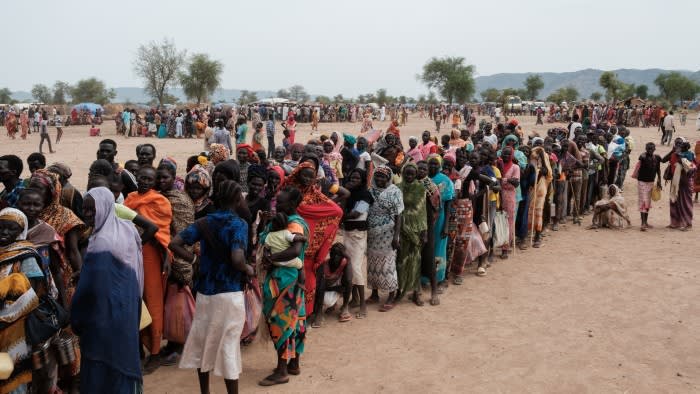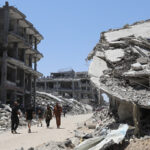The article discusses the complex and devastating conflict in Sudan, which began in April last year between two rival generals, Abdel Fattah al-Burhan and Mohamed Hamdan Dagalo (Hemeti). Here’s a detailed summary:
Overview:
The conflict in Sudan is not just a local power struggle but also a proxy war involving various regional powers. It has led to severe humanitarian crises, including mass displacement, acute hunger, and human rights abuses.
Key Points:
-
Humanitarian Crisis:
- The war has displaced 10 million people and brought 25 million to acute hunger.
- Famine conditions have been reported in the Zamzam camp in Darfur, with civilians suffering due to blocked food and medical supplies. Médecins Sans Frontières has reported repeated attacks on hospitals.
-
Regional Involvement:
- The conflict has attracted significant involvement from external powers. The United Arab Emirates, Turkey, China, and Russia have supplied weapons and military equipment, exacerbating the violence.
- Sudan’s neighbors are used as transit routes for arms, fueling the conflict further.
-
Proxies and Backers:
- The Sudanese Armed Forces (SAF) led by Burhan are supported by Egypt and Saudi Arabia.
- The Rapid Support Forces (RSF) led by Hemeti receive backing from the UAE and Russia.
- The RSF, emerging from the Janjaweed militia, has been accused of severe human rights abuses and is linked to the Russian mercenary group Wagner.
-
Complex Alliances:
- The alliances are not clear-cut, with both sides receiving varied support from regional and global actors.
- The UAE’s involvement is controversial, with some experts suggesting it backs the RSF due to concerns over Burhan’s ties to Islamists.
-
International Response:
- The West has been criticized for not paying enough attention to the conflict compared to other global crises.
- There have been multiple, unsuccessful mediation efforts. Recent developments include a provisional agreement for peace talks in Geneva, but the overall situation remains dire.
-
Future Outlook:
- The conflict is likely to continue for months or years due to the complex web of international interests and the difficulty of ending proxy wars.
- Sudan faces the risk of further fragmentation, potentially mirroring the past loss of South Sudan.
Conclusion:
The article underscores that the conflict in Sudan is driven by a web of regional and international interests, making it difficult to resolve. The humanitarian crisis and the involvement of various external actors have compounded the suffering and complexity of the situation, suggesting that a lasting resolution will be challenging.
Read more below.
War in Sudan is being fuelled by a web of external actors
The war in Sudan, when anyone gives it a second thought, is imagined as two sparring generals fighting over the carcass of a country. That is true as far as it goes. But the conflict that has displaced 10mn people, brought 25mn to acute hunger and unleashed human rights atrocities of frightening magnitude is also a proxy war.
The various sponsors of that war, which erupted in Khartoum in April last year, are rising middle powers in the broader region, including the Gulf. The shadow battle they are waging, replicated in a web of competing mediation efforts, makes the tangled “objectives” of the conflict harder to decipher and its resolution more intractable.
A recent report by Amnesty International found that weapons and military equipment supplied by the United Arab Emirates, Turkey, China and Russia had proliferated on the battlefield. Civilians have been the main casualties.
This month, the Integrated Food Security Phase Classification, an independent group of experts, declared famine conditions affecting half a million people in the Zamzam camp in northern Darfur. People have been fleeing there from the besieged city of El-Fasher, itself once a refuge but in recent months a scene of merciless bombardment. Médecins Sans Frontières reported last week that a hospital had been hit for the tenth time and that no food or medical supply trucks were getting through.
Nearly every one of Sudan’s seven neighbours are being used as transit routes for lethal materiel. “This conflict is being fuelled by an almost unimpeded supply of weapons,” Amnesty says.
When hostilities broke out last year between Sudan’s two most powerful generals — once allies in the 2019 overthrow of Omar al-Bashir’s 30-year reign — the worry was that regional powers would get sucked in. That fear has proved deadly accurate. Though Sudan has been floundering for decades, it has resources other countries crave: gold, arable land, a long stretch of the Nile and, most important, 750 kilometres of Red Sea coastline.
The proxies on each side don’t line up neatly — and they routinely deny involvement. But they go roughly like this. Behind the Sudanese Armed Forces and its commander Abdel Fattah al-Burhan stand Egypt and Saudi Arabia. The UAE and Russia are backing the Rapid Support Forces, a paramilitary group that grew out of the notorious Janjaweed, led by Mohamed Hamdan Dagalo, a former camel trader also known as Hemeti. Other foreign sponsors are more promiscuous in their support.
Burhan represents the Sudanese state, though humanitarians argue he has relinquished that claim by blocking food aid to swaths of the country controlled by the RSF. As well as using starvation to further their aims, Burhan’s forces have been accused by Amnesty and others of gross human rights abuses.
The RSF is even worse. Alex de Waal, an expert on Sudan at Tufts University, calls it “a looting and pillaging machine”. Victory for the RSF, which for years has done business with the Russian mercenary group once known as Wagner, would make Sudan a “wholly owned subsidiary of a transnational mercenary enterprise”, he says.
The UAE denies backing the RSF, though many independent experts — including a UN panel — have presented satellite and other evidence to indicate otherwise. Those who profess to understand the UAE’s motives say it suspects Burhan of being too close to Islamists. While Hemeti, despite a trail of genocide behind him, has managed to present himself as on the side of democracy.
This is one conflict where it is hard to blame the west for pulling the strings. If anything, it is guilty of paying too little attention. While the wars in Gaza and Ukraine are regarded as existential moral and strategic conflicts, it has been harder to get exercised about where justice lies on the Burhan-Hemeti divide.
Nor does either side look capable of decisive victory. Burhan’s forces have retreated from Khartoum to Port Sudan. Hemeti’s are dug in around Darfur. Khartoum is contested. Sudan, which already lost South Sudan to independence in 2011, could fracture further.
Until now, competing mediation initiatives have produced little more than broken ceasefires. There is a flicker of hope as Sudan’s government last month provisionally agreed to attend inclusive US-sponsored peace talks in Geneva.
But wars fought by proxy are hard to end, especially when the backers are overlapping alliances of middle powers. “Sudan is caught in a massive political tussle,” says Comfort Ero, president of the Crisis Group. Tragically, that means its war could drag on for months, or years. Even more tragically, it is not likely to be the last of its kind.
Source: Financial Times







